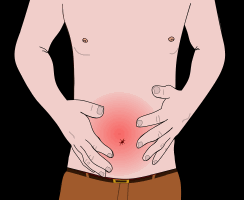Anti-inflammatory Drugs and Ulcers
A common class of anti-inflammatory drugs, known as NSAIDs (nonsteroidal anti-inflammatory drugs), are common villians when it comes to developing stomach ulcers. These drugs would include aspirin and ibuprofen. So – should I be worried?

What is a stomach ulcer?
Stomach ulcers (or peptic ulcers) are sores that may develop on the lining of your stomach (gastric ulcers) or in the upper small intestine (duodenal ulcers). This occurs when acid eats away at the lining. Normally, there is a protective mucous which keeps the acid from doing any harm. But there are some things that may cause an increase in acid or a decrease in the mucous shield.
There are some interesting misconceptions about stomach ulcers. For example, your stomach is well designed to handle spicy or acidic foods, so drinking a Coke or eating that spicy salsa isn’t likely to cause an ulcer. Neither is the common excuse – stress.
However, adding more acid or spicy food to your stomach may make ulcers worse. Since many people with ulcers may have few or no symptoms, it’s easy to believe the myths that the Mexican food actually caused the ulcer itself.
But one of the causes does seem to be NSAIDs.
Why might NSAIDs cause stomach ulcers?
Essentially, NSAIDs can cause problems with the “shield” that protects your stomach lining. They affect prostaglandins, a substance in your body critical to the protection of the stomach.
Look at it this way – by introducing something foreign into your body’s system, you are able to lower inflammation for a time, but you are also interfering with your body’s natural functions.
Taking one aspirin isn’t likely to cause a problem. But high doses of NSAIDs, or continued usage, may indeed lead to peptic ulcers.
How can I avoid stomach ulcers?
Stomach ulcers are common, and you may already have them and not know it. If you start getting symptoms, see your doctor.
Your best plan of attack is simply to limit your use of NSAIDs. Although a good rare or short term solution for headache, if you find yourself taking them every week or two, you should seriously consider changing your strategy.
Also, be sure to take your NSAID with food, if possible. And consider taking an NSAID that is less likely to harm the stomach (see more information at NSAIDs – Which One Should I Take For Headache?).
You could also discuss non-NSAID options with your doctor. There are pros and cons to each medication, so the best thing to do is to at least supplement the “painkillers” with changes in lifestyle that will fight headache.
In more extreme cases, or when you really can’t avoid the NSAIDs, your doctor may recommend other medication to help with the affects of these drugs.
For more information, check out Nonsteroidal Anti-inflammatory Drugs(NSAIDS) and Ulcers.
